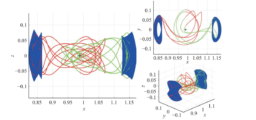Categorie: Comunicazioni
Tags: nanotecnologia Richard Feynman
Scritto da: Vincenzo Zappalà
Commenti:6
C’è molto spazio laggiù in fondo…
Mi è capitato di rileggere ancora una volta uno dei più geniali “pezzi” scritti da Richard Feynman. La sua conferenza ha dato praticamente l’avvio alla nanotecnologia nel lontano 1959 e può essere considerata una pietra miliare della fisica e della tecnologia. La propongo per chi ancora non la conosce. Leggendola, salta all’occhio che ancora oggi il genio di Richard non è stato compreso e sviluppato completamente. D’altra parte, è difficile seguire una strada che sembra quasi aliena alle menti comuni.
Questo il link alla versione originale e, visto che sul web non si trovava una traduzione in italiano, ci abbiamo pensato noi... eccola qui!
QUI potete leggere un altro importante discorso dello stesso autore “Il culto del cargo”, riflessione sull’etica del vero scienziato






6 commenti
Caro Enzo semplicemente splendido , basta guardare la data della conferenza 29/12/1959
, basta guardare la data della conferenza 29/12/1959 
Ci sono un sacco di cose che mi hanno colpito....e non solo per le anticipazioni sulle nanotecnologie, sulla possibilità di ridurre la scala delle “macchine”, anche usando macchine sempre più piccole, sulla riduzione delle memorie dei PC, sui circuiti stampati e sui circuiti integrati (inesistenti in quell'epoca), e mille alte cose con cui oggi abbiamo tutti i giorni a che fare.
Mi piace moltissimo come Feymann affronta la questione dell'informazione (mi piace anche perchè ho la tendenza a leggere anche l'universo, grande e piccolo, come un territorio attraversato ed animato da miliardi di informazioni codificate ), della possibilità di contenere un'enormità di informazioni in un piccolo spazio, di comprimere le informazioni, codificandole e decodificandole.
), della possibilità di contenere un'enormità di informazioni in un piccolo spazio, di comprimere le informazioni, codificandole e decodificandole.
In un epoca in cui i computer occupavano intere stanze, Feyman diceva:
“Suppose, to be conservative, that a bit of information is going to require a little cube of atoms 5 x 5 x 5 – that is 125 atoms. Perhaps we need a hundred and some odd atoms to make sure that the information is not lost through diffusion, or through some other process. “
Ma questa cosa degli atomi controllori che riducono la possibilità che l'informazione si deteriori non assomiglia molto a questo recente articolo sui Qbit e Qbit controllori?
http://www.infinitoteatrodelcosmo.it/2015/03/08/il-computer-che-si-corregge-da-solo/
O questa descrizione della biologia e del ridotto spazio in cui vengono contenute informazioni fondamentali:
“All this information – whether we have brown eyes, or whether we think at all, or that in the embryo the jawbone should first develop with a little hole in the side so that later a nerve can grow through it – all this information is contained in a very tiny fraction of the cell in the form of long-chain DNA molecules in which approximately 50 atoms are used for one bit of information about the cell. “
O il suo suggerimento ai biologi ed i fisici di realizzare un microscopio elettronico, capace di aumentare la scala dell'immagine di ulteriori 100 volte, arrivando così a poter distinguere i singoli atomi:
“The electron microscope is not quite good enough, with the greatest care and effort, it can only resolve about 10 angstroms. I would like to try and impress upon you while I am talking about all of these things on a small scale, the importance of improving the electron microscope by a hundred times. It is not impossible; it is not against the laws of diffraction of the electron. The wave length of the electron in such a microscope is only 1/20 of an angstrom. So it should be possible to see the individual atoms. What good would it be to see individual atoms distinctly? “
Tra l'altro nella conferenza affronta anche le questioni legate ai limiti risolutivi del microscopio e di come si potrebbero superare.
Feyman affronta elegantemente la questione della miniaturizzazione, in cui ad ogni cambiamento di scala è necessario affrontare problemi nuovi, limiti nuovi, ma anche nuove proprietà, dato che più ci si avvicina alla scala dell'atomo più cambiano i comportamenti (come insegna la fisica quantistica):
“When we get to the very, very small world – say circuits of seven atoms – we have a lot of new things that would happen that represent completely new opportunities for design. Atoms on a small scale behave like nothing on a large scale, for they satisfy the laws of quantum mechanics. So, as we go down and fiddle around with the atoms down there, we are working with different laws, and we can expect to do different things. We can manufacture in different ways. We can use, not just circuits, but some system involving the quantized energy levels, or the interactions of quantized spins, etc.”
Di una eleganza e semplicità spiazzante, quando tra le potenzialità di strutture molto piccole, descrive la perfetta riproducibilità (se una “macchina” è alta 100 atomi, basta contenere l'errore di lavorazione nella metà di 1/100... e dato che l'atomo è indivisibile ..... la copia è identica):
..... la copia è identica):
“Another thing we will notice is that, if we go down far enough, all of our devices can be mass produced so that they are absolutely perfect copies of one another. We cannot build two large machines so that the dimensions are exactly the same. But if your machine is only 100 atoms high, you only have to get it correct to one-half of one percent to make sure the other machine is exactly the same size – namely, 100 atoms high! ”
Infine l'idea di poter riorganizzare gli atomi (la fisica della chimica):
“A chemist comes to us and says, "Look, I want a molecule that has the atoms arranged thus and so; make me that molecule." The chemist does a mysterious thing when he wants to make a molecule. He sees that it has got that ring, so he mixes this and that, and he shakes it, and he fiddles around. And, at the end of a difficult process, he usually does succeed in synthesizing what he wants. By the time I get my devices working, so that we can do it by physics, he will have figured out how to synthesize absolutely anything, so that this will really be useless.
But it is interesting that it would be, in principle, possible (I think) for a physicist to synthesize any chemical substance that the chemist writes down. Give the orders and the physicist synthesizes it. How? Put the atoms down where the chemist says, and so you make the substance. The problems of chemistry and biology can be greatly helped if our ability to see what we are doing, and to do things on an atomic level, is ultimately developed – a development which I think cannot be avoided.”
Beh che dire una conferenza così non poteva che chiudersi in bellezza, con un'idea della scienza e delle possibilità, potenzialità legate all'agire insieme, che condivido completamente, parola per parola :
:
“Now, you might say, "Who should do this and why should they do it?" Well, I pointed out a few of the economic applications, but I know that the reason that you would do it might be just for fun. But have some fun! Let's have a competition between laboratories. Let one laboratory make a tiny motor which it sends to another lab which sends it back with a thing that fits inside the shaft of the first motor. ”
Bellissimo!
Paolo
Richard Feynman
Mi sa che i miei atomi controllori non funzionano un gran chè
Hai proprio ragione Paolo,
leggere un pezzo di Richard (e questo in particolare) è come prendere una boccata d'aria fresca, sentirsi parte dell'Universo, capire il valore enorme della mente e rendersi conto che ilo 99% del tempo dell'uomo è tempo sprecato!
Una conferenza che è veramente un'opera d'arte del cervello. Dovrebbe essere fatta studiare a scuola!!!
In attesa di leggere il discorso per intero (che ho già stampato e messo in borsa), grazie alla tua sintesi, Paolo, ho compreso il perché di quel sorriso di Feynman che aveva catturato la mia attenzione in questo video https://www.youtube.com/watch?v=DZGINaRUEkU
Nessun mistero... solo FUN!!!

Ovvero, Prof., esattamente quel che manca nelle nostre scuole... ...noiosissime nozioni fini a se stesse e ragazzi che fanno fatica ad alzarsi la mattina al pensiero di cosa li aspetta!!
...noiosissime nozioni fini a se stesse e ragazzi che fanno fatica ad alzarsi la mattina al pensiero di cosa li aspetta!!
Lo so, ho scoperto l'acqua calda (come si dice a Firenze...) ma, se a forza di parlarne, riuscissi a far cambiare atteggiamento ad un solo insegnante, sarebbe già un gran successo!!
Ben detto, Mr Feynman!
Cara Daniela, come avrai modo di leggere, non a caso la conferenza finisce proprio con una proposta rivolta alle scuole.
Personalmente ritengo che il nozionismo uccida la curiosità e senza curiosità non si impara nulla, al limite si riproduce continuamente ed in forma acefala una filastrocca di cui non si è compreso il senso (un pò come quando un vinile cavalca sempre lo stesso solco e la musica si perde..)
Paolo